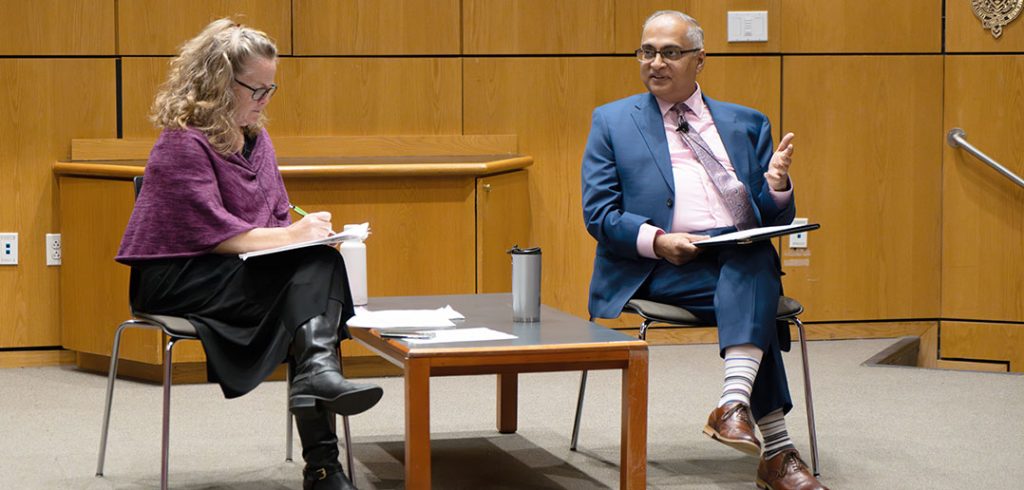“Just as now we are erasing over 200 species a day, [the work of missionaries], when wedded to religious supremacy, has worked deliberately and actively to erase religious and linguistic diversity,” said John J. Thatamanil, MDiv., Ph.D., at an event geared towards first-year students at Fordham’s Lincoln Center campus on Oct. 11.
“You cannot have an adequate analysis of how we got here without having an understanding of colonialism and imperialism, and you can’t understand how those forces work if you have no account of religious supremacy.”
In his talk “Enchanted Earth: Addressing the Plight of the Earth by Overcoming Religious Supremacy,” Thatamanil, a professor of theology and world religions at Union Theological Seminary and an eminent scholar of comparative theology, drew on the essay “Whose Earth Is it Anyway?” (University of North Carolina Press, 2000), a groundbreaking essay by James Cone, Ph.D.
All first-year undergraduate Fordham students taking the core curriculum class Faith and Critical Reason this semester read the essay. Many were present for the event at McNally Ampitheatre, which was sponsored by the Department of Theology and is part of the undergraduate Theology First-Year Experience program. It was open to everyone and live streamed to the Rose Hill campus.
The Perils of Religious Supremacy
While Cone connected the behavior that leads to slavery and segregation to the exploitation of animals and the ravaging of nature, Thatamanil suggested that those who embrace religious supremacy will inevitably embrace racism and ecological degradation.
In an onstage conversation with Jeannine Hill-Fletcher, Ph.D., professor of theology, Thatamanil said that in addition to Christianity, prominent 18th-century European intellectuals also promoted a form of scientism, which he said elevates the logical above the transcendent. Animism, an orientation embraced by Native Americans that posits that objects, places, and creatures all possess a distinct spiritual essence, was dismissed as primitive.
That belief in scientism stemmed in part from the metaphor, which was popular at the time, of God as a watchmaker.
“If we imagine nature as a mechanism, not an organism, then there must be a watchmaker. But is the watchmaker present in the watch? No, but maybe the watchmaker’s genius is present in the watch,” Thatamanil said.
“So if God is outside creation, then creation gets desacralized and conveniently becomes handy for capitalism. You can do with it as you please.”
Learning From Other Traditions
There are, in fact, many Christian teachings that do not lend themselves to conquest of the natural world, he said, and by engaging with other faiths, one can rediscover them.
“Imagine missionaries that came to the Americas with … a sense of ‘What do the First Nation peoples have to teach me?’ ” he said.
“So I think our traditions can be helped by each other. An encounter with indigenous traditions, with Buddhism, with Hinduism can recover submerged, suppressed, and repressed elements of our own tradition.”
Claire Harvey, a first-year student at Fordham College at Lincoln Center who is considering a visual arts major and a theology minor, said she was particularly moved by Thatamanil’s telling of how Gandhi welcomed Christian missionaries but also scolded them for being unreceptive to the lessons Hindus could share with them.
“I thought that was really interesting. I had never thought about the connection between colonialism and religious supremacy,” she said.
Likewise, Thatamanil’s take on Cone’s writing made a deep impression on her.
“He made a really great point about the climate crisis, how you have to fight racism if you want to fight climate change,” she said.
“I knew that people of color are disproportionately affected by the effects of climate change, but I had never heard it put like that. It made a lot of sense to me.”


